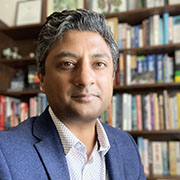Today we publish further details of our doctoral focal awards.
There already has been a thoughtful response from the community following our announcement of changes on 20 September.
For this we are exceedingly grateful; we share your passion and ambition to ensure that arts and humanities doctoral training is impactful, diverse and inclusive.
I’d like to reflect on how our consideration of individual student experience and the life-choice each student makes in carrying out a PhD has led us to a new shape to our doctoral offer.
We know that each student electing this pathway does so with a large degree of uncertainty.
Will I have access to the Arts and Humanities Research Council (AHRC) funding and will it be enough to cover the ambition of my project? Will I be given access to the resources and facilities to curate connections required to enable ground-breaking research? Will the skills I develop lead me to the career I have always wanted?
These questions are ones of monumental importance to each student, and so too for AHRC.
How can we invest in doctoral training in a way which delivers our ambition to support outstanding early career researchers from any background? How can we ensure that all students have the skills and experience they need to thrive?
We have heard these concerns from the sector too.
In developing our overarching approach to future doctoral provision, we have thought long and hard about our role as a strategic funder in doctoral training and our responsibilities in supporting equitable opportunities for all early career researchers.
We have maintained two priorities at the heart of these awards.
These are to ensure that our investments are targeted at sectors with a clear requirement for skills, and that we create a route for personal progression that is inclusive and open to outstanding early career researchers from all backgrounds.
Cohort-based approach
Let me start with the value of cohorts. We want to ensure that studentships do not occur in isolated silos.
Both within the host universities, where we expect students holding our studentships to be well integrated into the local research and innovation ecosystem, as well as into wider academia, as we encourage publicly funded PhDs to have wider public purpose.
Our intention is to enable a diversity in ideas, pushing forward the boundaries of knowledge and understanding, and to capture the benefits to build a better future for all (see page eight in the PDF).
Across all our schemes, we will catalyse strong, equitable collaboration, of every kind. Our aim is to empower partners to enable students to thrive in different contexts, for talent and research to operate across multiple environments.
Through doctoral landscape awards, for which we will utilise a formula approach to allocate studentship funding, students will be located in strong research environments.
We will empower higher education institutions with these studentships and enable local widening participation strategies, as well as incentivising regional ownership and support of cohorts through hubs for AHRC arts and humanities students. We will announce more on this in the new year.
Our new doctoral focal awards constitute our way to facilitate sectoral or thematic deep dives and fill evidence-based gaps, which collectively the focal awards can address.
Collaboration and partnership, across a diverse range of partners, with the role of our small specialist institutions properly thought through, is key to the success of these awards.
We see genuine potential for innovative partnership, so we expect in-kind support from all partners involved.
Financial match funding is welcome too, though we recognise smaller institutions may not be able to make such commitments and we don’t want to create barriers to their participation.
But we also expect to make strong progress within the cohort student population, and applicants to this funding opportunity will need to explicitly address how they will support inclusion and diversity through an action plan which will be assessed.
Furthermore, we are encouraging small specialist institutions to lead and co-lead on applications, and we are particularly keen to understand the barriers to such institutions applying to this funding.
Place
For us, investment in people must accompany an investment in places too, and we truly mean for our investment to open new horizons for those aspiring to a research career.
For doctoral landscape awards, the formula approach enables us to distribute doctoral funding across all regions and nations of the UK. At the same time, when awarding focal awards, we will ensure there is no unintended geographic clustering so that our awards genuinely address skills gaps and enable access right across the UK.
We see both the focal and doctoral landscape awards, alongside our ongoing commitment to Collaborative Doctoral Partnerships we funded earlier this year, as a balanced portfolio approach to support the entire arts and humanities research ecosystem.
Supporting a holistic studentship experience
Critical to our offer is investment in wider transferable skills development against a depth of disciplinary knowledge. I want to be clear that our support is intended to enable students to enter a variety of careers, both academic and non-academic.
The increases to stipends which have been confirmed by UK Research and Innovation (UKRI) are a major part of this, as is a review of the sustainability of doctoral training. We are ensuring that every AHRC student will have access to a strong financial package, and we will continue to provide four years of funding per student, giving flexibility to support a strong and diverse arts and humanities student cohort.
Doctoral focal award themes
This brings me to the themes we are highlighting as part of our new doctoral focal awards.
Formerly pre-announced as focused Centres for Doctoral Training, this is the same funding opportunity but under a new name to align it with other upcoming UKRI doctoral funding opportunities.
The new name reflects our refreshed focus on high collaboration, increased inclusion and a challenge-led approach.
The two themes are intentionally broad and developed through work with our advisory groups and key stakeholders from our community.
Healthy planet, people and place theme
This theme follows a series of other investments, beyond doctoral training, that address the interaction between environmental change, environmental factors such as lifestyle and place, and wellness and wellbeing for all.
We are encouraging applications which use the lens of intergenerational justice to explore issues relating to health, ageing and wellbeing and the health of the environment.
We are encouraging a number of approaches, including:
- the exploration of how doctoral researchers can use deep storytelling methods and narrative methodologies to represent and engage with different perspectives
- the ways in which a place-led approach can improve our understanding of the complex relationship between people and the environment
The creative economy theme
This theme is proximal to our strong investments in the creative industries.
Yet we know there are gaps and shortages, including in creative practice and practice-based research more generally, and especially in the diversity of the talent pool within the creative economy.
And we know that the best new ideas can often grow from broad based doctoral research, where talented researchers can introduce new questions, challenges and solutions.
Our investment in doctoral focal awards should act as a catalyst to further innovation right across our portfolio, that will feed and shape our future investment in the creative economy.
Addressing skills gaps and shortages
Our intention with the focal awards is to address known and anticipated research skills gaps and shortages and facilitate employability of doctoral graduates.
We must invest in the arts and humanities postgraduate talent pipeline to enable the kind of research leadership that is uniquely placed to deliver research and innovation for the good of society.
Our firm commitment is to continue to identify and fund new themes, individually and working across UKRI, to systematically invest in developing innovative routes for doctoral study through an enriched learning and development environment.
For future themes, we’d like to be even more collaborative, and we welcome ideas through our Where Next? platform.
Webinars
I’ll end with a note about future engagement.
For those potential applicants for doctoral focal awards, we are holding a series of webinars for you to engage and ask questions.
This includes a webinar specifically designed for small specialist institutions, who face unique challenges in applying.
See the full details on the funding opportunity.
Beyond that specific opportunity, we want to continue to listen and engage, whether on the innovations we need to support within doctoral training structures, on how we can better support collaboration in all its form, or on future themes.




